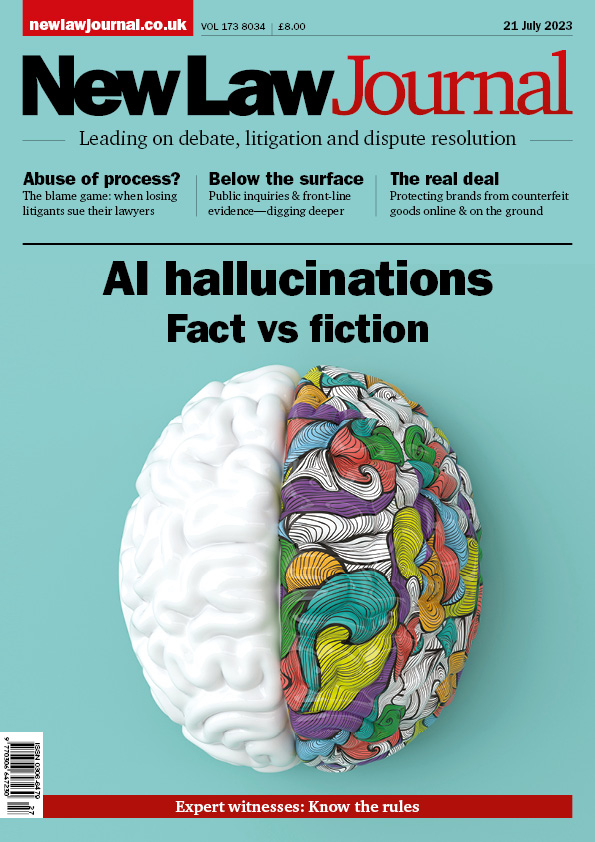THIS ISSUE

Artificial intelligence (AI) tools are known to ‘hallucinate’, making up false information or confabulating to fill gaps in their knowledge. But who is responsible in law for any libel or harm caused as a result? In this week’s NLJ, Chloe Flascher, associate at Withers, addresses this fascinating conundrum.
In this week’s NLJ, Richard Scorer, head of abuse law & public inquiries at Slater and Gordon, highlights the necessity of ‘proper forensic scrutiny’ during public inquiries.
A recent employment appeal concerning a teacher dismissed for expressing gender-critical views on Facebook is a significant development in employment law because the Employment Appeal Tribunal (EAT) focused on the ‘reason why’ question. In this week’s NLJ, Charles Pigott, professional support lawyer, Mills & Reeve, explains why the EAT’s approach ‘marks a significant development’ for discrimination claims, breaking new ground.
'Litigants who lose sometimes blame their lawyer' is a truth widely acknowledged in the legal sector. Writing in this week’s NLJ, Michael Bundock, barrister, dispute resolution, LexisNexis, looks specifically at the circumstances in which a negligence claim may be struck out as an abuse of process because it involves a collateral attack on the earlier judgment.
Public inquiries are most effective when their scrutiny goes below the surface, writes Richard Scorer
A recent Employment Appeal Tribunal ruling on gender-critical beliefs has brought human rights to the fore: Charles Pigott analyses a significant development for discrimination claims
What next when a disgruntled litigant decides to sue their lawyer for negligence after losing a case? Michael Bundock examines when such a claim may be struck out as an abuse
Neil Parpworth outlines the latest thinking—& some potential inaccuracies—from the Home Office on stop & search powers
Billions are spent on counterfeit goods in the EU & UK each year: Matti Lindberg & My Mattsson set out some top tips for brand owners to protect their rights online & on the ground
Artificial intelligence tools are not (yet) above creating false information: who could be liable for the serious harm suffered as a result of publishing that information? Chloe Flascher examines a thorny legal issue
MOVERS & SHAKERS

NLJ Career Profile: Sonya Sceats, the British Institute of International and Comparative Law
Sonya Sceats, next director and CEO of the British Institute of International and Comparative Law, discusses her long-standing mission to uphold and defend the rule of law

Anthony Collins—four appointments
Property and commercial teams bolstered by senior hires

Keystone Law—Ben Knowles
International arbitration specialist strenghtens the team
NEWS
Manchester’s online LLM has accelerated career progression for its graduates
Judging is ‘more intellectually demanding than any other role in public life’—and far messier than outsiders imagine. Writing in NLJ this week, Professor Graham Zellick KC reflects on decades spent wrestling with unclear legislation, fragile precedent and human fallibility
The long-predicted death of the billable hour may finally be here—and this time, it’s armed with a scythe. In a sweeping critique of time-based billing, Ian McDougall, president of the LexisNexis Rule of Law Foundation, argues in this week's NLJ that artificial intelligence has made hourly charging ‘intellectually, commercially and ethically indefensible’
From fake authorities to rent reform, the civil courts have had a busy start to 2026. In his latest 'Civil way' column for NLJ this week, Stephen Gold surveys a procedural landscape where guidance, discretion and discipline are all under strain
Fact-finding hearings remain a fault line in private family law. Writing in NLJ this week, Victoria Rylatt and Robyn Laye of Anthony Gold Solicitors analyse recent appeals exposing the dangers of rushed or fragmented findings







